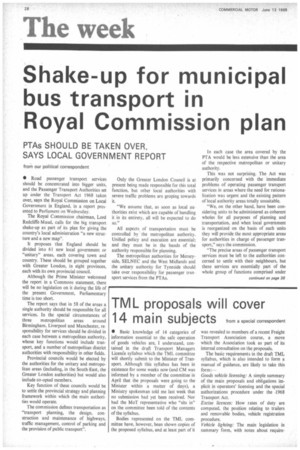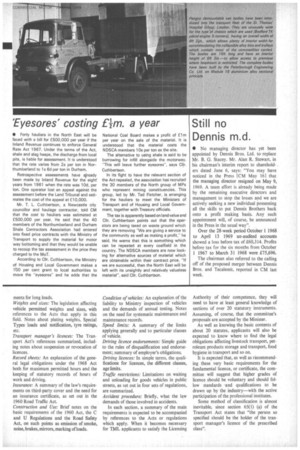TML proposals will cover
Page 30

Page 31

If you've noticed an error in this article please click here to report it so we can fix it.
14 main subjects from a special correspondent
• Basic knowledge of 14 categories of information essential to the safe operation of goods vehicles are. I understand, contained in the draft Transport Managers Licence syllabus which the TML committee will shortly submit to the Minister of Transport. Although this syllabus has been in existence for some weeks now (and CM was informed by a member of the committee in April that the proposals were going to the Minister within a matter of days), a Ministry spokesman told me last week that no submission had yet been received. Nor had the MoT representative who "sits in" on the committee been told of the contents of the syllabus.
Bodies represented on the TML committee have, however, been shown copies of the proposed syllabus, and at least part of it was revealed to members of a recent Freight Transport Association course, a move which the Association took as part of its internal consultation on the proposals.
The basic requirements in the draft TML syllabus, which is also intended to form a manual of guidance, are likely to take this form:—
Goods vehicle licensing: A simple summary of the main proposals and obligations implicit in operators' licensing and the special authorizations procedure under the 1968 Transport Act.
Excise licences: How rates of duty are computed, the position relating to trailers and removable bodies, vehicle registration procedure.
Vehicle lighting: The main legislation in summary form, with notes about require ments for long loads.
Weights and sizes: The legislation affecting vehicle permitted weights and sizes, with references to the Acts that apply in this field. Notes about plating weights, Special Types loads and notification, tyre ratings, etc.
Transport manager's licences: The Transport Act's references summarized, including notes about suspension or revocation of licences.
Record sheets: An explanation of the general legal obligations under the 1968 Act both for maximum permitted hours and the keeping of statutory records of hours of work and driving.
Insurance: A summary of the law's requirements on third-party cover and the need for an insurance certificate, as set out in the 1960 Road Traffic Act.
Construction and Use: Brief notes on the basic requirements of the 1960 Act, the C and U Regulations and the Road Safety Act, on such points as emission of smoke, noise, brakes, mirrors, marking of loads. Condition of vehicles: An explanation of the liability to Ministry inspection of vehicles and the demands of annual testing. Notes on the need for systematic maintenance and maintenance records.
Speed limits: A summary of the limits applying generally and to particular classes of vehicle.
Driving licence endorsements: Simple guide to the rules of disqualification and endorsement; summary of employer's obligations. Driving licences: In simple terms, the qualifications for licences, the different classes, age limits.
Traffic restrictions: Limitations on waiting and unloading for goods vehicles in public streets, as set out in four sets of regulations, are summarized.
Accident procedure: Briefly, what the law demands of those involved in accidents.
In each section, a summary of the main requirements is expected to be accompanied by references to the Acts or regulations which apply. When it becomes necessary for TML applicants to satisfy the Licensing Authority of their competence, they will need to have at least general knowledge of sections of over 20 statutory instruments. Assuming, of course, that the committee's proposals are accepted by the Minister.
As well as knowing the basic contents of about 20 statutes, applicants will also be expected to know where to find the legal obligations affecting livestock transport, petroleum products storage and transport, food hygiene in transport and so on.
It is expected that, as well as recommending these very basic requirements for the fundamental licence, or certificate, the committee will suggest that higher grades of licence should be voluntary and should follow standards and qualifications to be drawn up by the industry—with the active participation of the professional institutes.
Some method of classification is almost inevitable, since section 65(1) (a) of the Transport Act states that "the person so specified should be the holder of the transport manager's licence of the prescribed class".
























































































































































